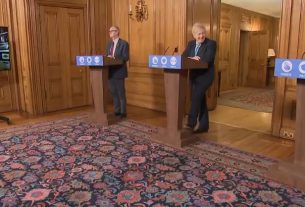Boris Johnson’s government does not have time to include an Employment Bill in the Queen’s Speech – even after the recent mass sackings by P&O Ferries.
It means legislation to protect the rights of the lowest paid and most exploited workers in the UK will be shelved for the second successive year.
The promised legislation – like other policies – is already long overdue. A government review in 2019 into working conditions and practices in low paid sectors warned of a growing risk of worker exploitation in post-Brexit Britain.
An Employment Bill was announced in Johnson’s first Queen’s Speech, in December 2019, but one has never materialised. And when asked if the Employment Bill will be in next month’s Queen’s speech, a government source told the Financial Times. “Not everything we want to do can we find space for in one season; we can’t do everything we want to do immediately.”
The government’s own director of Labour Market Enforcement, Matthew Taylor quit in February last year over the government’s inaction, citing indifference and complacency, “inertia and incompetence. He admitted “some people will think this is ideological”.
Employment bill is not a priority
Evidence that it is is mounting, despite the government’s rhetoric about levelling-up and the outrage it expressed in the wake of the P&O scandal.
That “should have marked a turning point for workers’ rights,” said TUC general secretary Frances O’Grady. However, by once again ditching the Employment Bill, “the government is sending a message that it is happy for rogue employers to treat staff like dirt.”
TUC general secretary Frances O’Grady said the prime minister “looks to have broken his word yet again” and slammed the “betrayal of working people” – especially in light of the P&O Ferries sackings.
“Not everything we want to do can we find space for in one season; we can’t do everything we want to do immediately,” says the government. Which means its legislative programme is its priorities; sorting out what matters most for the country, Especially in such times as these.
As such, low paid workers and those on zero-hour contracts will simply have to wait. There isn’t time now to legislate against their exploitation, the government says, with everything else that’s going on. Like the cost of living crisis, the climate crisis, inflation, NHS waiting lists, foodbanks, Covid, Ukrainian refugees, children’s mental health, partygate, human rights, political integrity and democracy itself.
Which is why news that Channel 4 will be privatised is so bewildering.
Dorries didn’t know
Culture secretary Nadine Dorries – who didn’t know how Channel 4 is funded when she appeared before MPs last November– made the announcement on Twitter on Monday (April 4). “I have come to the conclusion that government ownership is holding Channel 4 back from competing against streaming giants like Netflix and Amazon,” Dorries posted. Dissenters however, said it is revenge being carried out by a petty cabal of Brexiters incensed by the channel’s coverage.
The predictable outrage has had the desired effect and given Johnson’s base some ‘red-meat’ to get their teeth into. And it’s helped shift attention and debate away from the actual urgent issues that urgently need addressing in the UK towards something that no-one has really seemed so exercised about.
Until it’s revealed how the channel’s supporters have reminded that although it is publicly owned, Channel 4 is self-funded, generates tax, boosts Britain’s ‘soft-power’, sustains a media and creative sector, ploughs profits back into British production companies, and doesn’t cost the tax-payer a penny.
The sale will raise £1 billion for the government and be utterly devastating for the production companies that provide Channel 4’s content – a massive number of which are based outside London.
The proposed privatisation is so economically illiterate and at odds with levelling-up that even senior Conservatives are joining the backlash against it.
Dorries has promised a white paper “in due course” but by now people know the value of this government’s promises and pledges. Just ask the DUP, or fishermen, or farmers, or Ukrainian refugees. Or bereaved families who followed Covid laws.
Or ask poorly paid and exploited workers. They have long been promised protection by their government in the form of legislation. They are still waiting for the employment bill and have been since well before 2019.
But, the government says, “we can’t do everything we want to do immediately” because first we must privatise Channel 4.
And a billion is a billion after all. Just think how much dodgy PPE Johnson’s Tories could buy for that.




